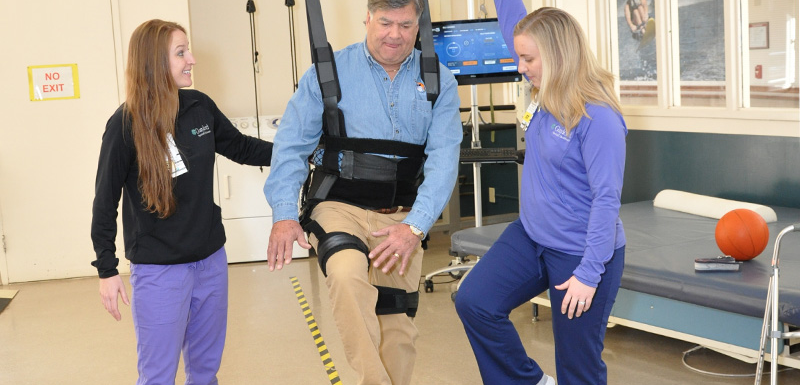
License: Creative Commons Attribution + Noncommercial + NoDerivatives (CC-BY-NC-ND)
Source: Gaylord Specialty Healthcare
Copyright: Gaylord Specialty Healthcare
URL: https://rehab.jmir.org/2022/1/e31504/
License: CC-BY-NC-ND
WALLINGFORD, CONNECTICUT, March 01, 2022 — A new report from Gaylord Specialty Healthcare’s Milne Institute for Healthcare Innovation was published today in the journal JMIR Rehabilitation and Assistive Technologies evaluating the effect of a new balance perturbation module on balance impairments following an acute stroke.
The study, HYPERLINK A Novel Body Weight–Supported Postural Perturbation Module for Gait and Balance Rehabilitation After Stroke: Preliminary Evaluation Study, demonstrates that balance perturbations in a recently developed and not-yet-reported balance perturbation program for the Aretech LLC ZeroG body weight support system positively impacted the balance performance of a subset of stroke inpatients at Gaylord Hospital, a long-term acute care hospital in Wallingford, Connecticut. The program, known as Training Responses in Postural rehabilitation, or TRiP, helped to improve participants’ overall confidence and reduce their fear of falling.
Primary investigator, Amanda Meyer, MS, OTR/L, Gaylord Hospital inpatient occupational therapist, explained, “Because of the novelty of the TRiP program, the study had three goals: to evaluate the safety and feasibility of using the technology in the clinical setting, to develop a practical protocol for clinical use, and determine if there is evidence to suggest that the perturbation system conveys additional benefit to gait and balance rehabilitation after stroke.”
The use of body weight support systems following a stroke, spinal cord injury, or other neurological disorders has expanded over the last two decades. These systems support patients’ body weight, permitting those with excessive weakness and poor coordination to safely walk and perform more intensive therapy sessions sooner in their recovery while protecting them from injurious falls.
In addition to body weight support systems, balance perturbation systems improve gait and balance control after stroke or in response to other age and disease-related balance impairments. This is accomplished by purposefully unbalancing patients so they can rehabilitate their postural control.
Compared to past devices that use a tilt table or modified treadmill, the ZeroG TRiP balance perturbation training module is directly integrated into the system allowing therapists to induce safe lateral, anterior, and posterior perturbations via a Wi-Fi–enabled handheld device.
To be considered for the study, inpatient stroke rehabilitation patients had to score 21 or greater on the Berg Balance Scale, be 18 years or older, and be able to tolerate and participate in at least three 30-minute weekly sessions in the ZeroG.
Of the 29 participants who completed the treatment course, 15 were assigned to the control group and 14 to the perturbation group.
During both stationary and ambulatory activities, the system was used to unbalance participants in the perturbation group to train their balance control.
In addition to developing a practical protocol for clinical use and confirming the safety of the ZeroG TRiP system, both groups showed similar improvements in balance, balance confidence, and walking, indicating that the protocol is not detrimental and may benefit post–acute stroke balance deficits.
“While the research is promising, it warrants further investigation to reach a definitive conclusion about the efficacy of the ZeroG TRiP system. As the prevalence of these systems continue to grow, there will be a number of opportunities for further research and development in this area,” said Meyer.
Gaylord Specialty Healthcare’s Milne Institute for Healthcare Innovation is currently conducting a multisite clinical trial to further test the efficacy of the ZeroG TRiP system. To learn more, click here.
About Gaylord Specialty Healthcare:
Gaylord Specialty Healthcare is a rehabilitation-focused, nonprofit health system headquartered in Wallingford, Connecticut, that provides inpatient and outpatient care for people at every point in their journey from illness or injury to maximum recovery.
Gaylord Specialty Healthcare is anchored by Gaylord Hospital, a long-term acute care hospital, and includes Gaylord Outpatient Services and Gaylord Physical Therapy for patients who require diagnosis and treatment on an outpatient basis. Gaylord’s Milne Institute for Healthcare Innovation is a hub for accelerating world-class rehabilitative research, technology development, and innovation to improve the quality of life and function of people around the world. Together, these entities deliver a complete continuum of rehabilitative care driven by clinical experience, innovation, and human compassion.
Original article:
Meyer A, Hrdlicka HC, Cutler E, et al. A Novel Body Weight–Supported Postural Perturbation Module for Gait and Balance Rehabilitation After Stroke: Preliminary Evaluation Study. JMIR Rehabil Assist Technol. 2022;9(1):e31504.
URL: https://rehab.jmir.org/2022/1/e31504/
doi: 10.2196/31504
PMID:
